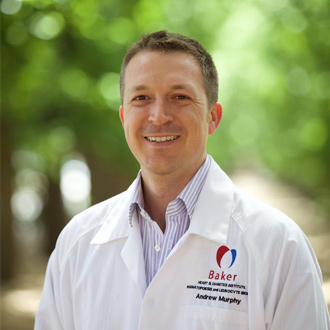Professor Andrew Murphy

Head
Haematopoiesis and Leukocyte Biology
Co-Lead
Heart Attack Program
La Trobe University supervisor
Monash University supervisor
NHMRC Investigator | CSL Centenary Fellow
+61 3 8532 1292 andrew.murphy@baker.edu.auProfessor Andrew Murphy obtained a BSc(Hons) in Biotechnology from the Queensland University of Technology (QUT) in Brisbane and a PhD (Monash University) at the Baker Heart and Diabetes Institute, funded by an industry scholarship from the Swiss biotech company Actelion. During this time, he discovered an anti-inflammatory role for HDL on circulating monocytes and neutrophils both published in ATVB. Upon completing his PhD, Andrew moved to Columbia University in New York under Professor Alan Tall, where he was funded by a prestigious American Heart Association Fellowship. His work shifted to examining the role of cholesterol efflux pathways on the proliferation and mobilisation of haematopoietic stem cells (HSCs) in the bone marrow. Specifically, he defined a cell-intrinsic role for ApoE in regulating HSC proliferation and showed that increased numbers of circulating monocytes resulted in larger lesions, which was published in the Journal of Clinical Investigation. He also discovered the haematopoietic role of the cholesterol transporter ABCG4 in platelet production and atherosclerosis, along with defining an important feedback loop for the thrombopoietin receptor c-MPL, published in Nature Medicine.
Professor Murphy also initiated several collaborations in New York, in particular with Professor Ira Goldberg and Professor Edward Fisher (NYU) along with A/Professor Prabhakara Nagareddy (University of Oklahoma Health and Sciences Center) to explore the mechanisms of diabetes (hyperglycaemia) on monocyte production. They were the first to show that the novel glucose-lowering agent (SGLT2 inhibitors) could reduce circulating monocyte levels and facilitate atherosclerotic lesion regression. They discovered the damage associated molecular pattern molecules as important mediators of this event. These studies published in Cell Metabolism have triggered an extensive and collaborative research program run by these investigators with publications in Cell Metabolism, Circulation and Circulation Research, Journal of Clinical Investigation, etc.
In 2013, Professor Murphy was recruited back to the Baker Heart and Diabetes Institute and was funded by the prestigious Viertel Award from Diabetes Research Trust Australia where he began to build his research team. Since 2013, Professor Murphy has held fellowships including, an NHMRC Career Development Fellowship, a National Heart Foundation Future Leader Fellow, the highly prestigious CSL Centenary Fellowship and is currently an NHMRC investigator fellow. He has held Project Grants from the NHMRC and members of his laboratory are supported by fellowships from the NHMRC, NHF, Novo Nordisk and Jack Brockhoff Foundation along with NHMRC Ideas Grants.
Professor Murphy also leads the Inflammation and Immunometabolism Program, comprised of six core laboratories at the Institute focused on how the immune system contributes to cardiovascular and metabolic disorders. He also sits on the Gender Equity and Diversity Committee and has previously chaired the Research Training and Education Committee and Science Faculty.
His laboratory focuses on haematopoiesis largely in the context of accelerators of cardiovascular disease including somatic mutations, co-morbidities and diets (more details and research opportunities are available on our laboratory page).
He has >150 publications in leading journals including Nature Medicine, Nature Cell Biology, Nature Reviews Immunology, Cell Stem Cell, Cell Metabolism, Journal of Clinical Investigation, European Heart Journal and Circulation.

